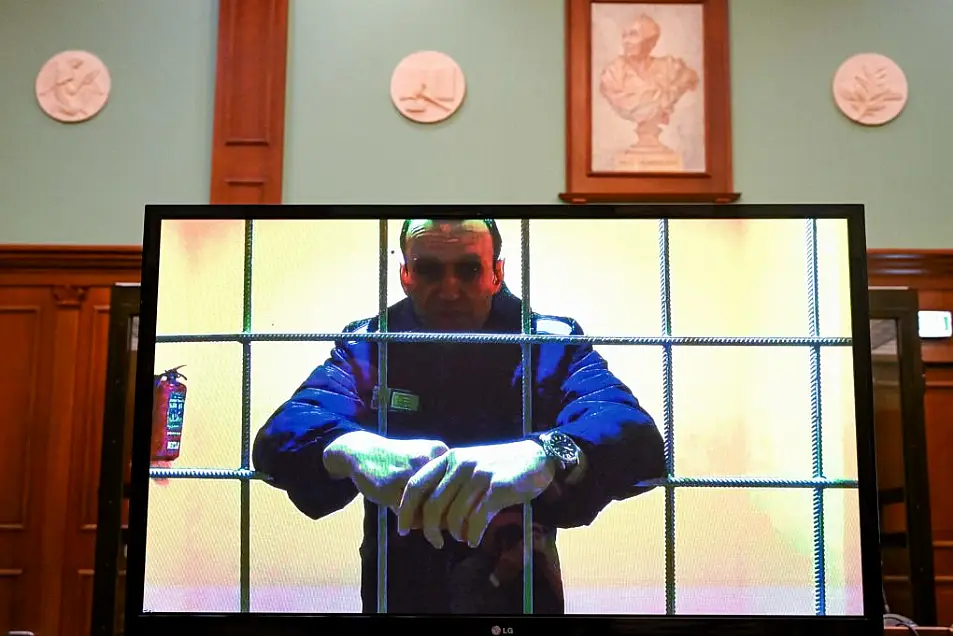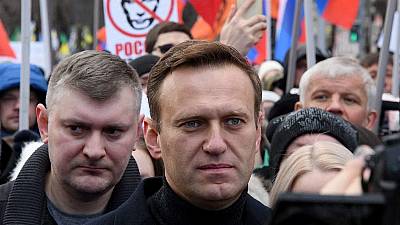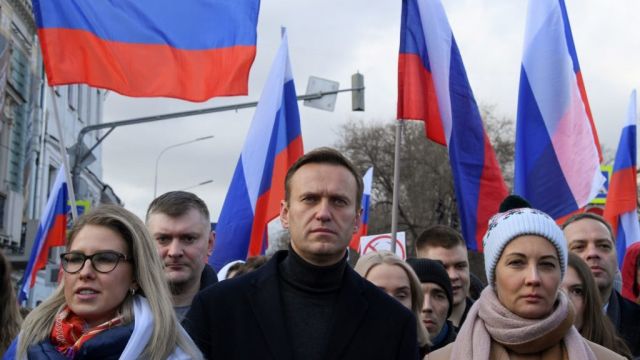Jailed Russian opposition leader Alexei Navalny is dead, the prison service of the Yamalo-Nenets region where he had been serving his sentence said on Friday.
In a statement published on its website, the Federal Penitentiary Service of the Yamalo-Nenets Autonomous District said the 47-year-old "felt unwell" after a walk on Friday, and "almost immediately lost consciousness".
It said that medical staff had been called, but that they were unable to resuscitate Mr Navalny. It said the reason of death was being established.
After news of Mr Navalny's death broke on Friday morning, the Kremlin's spokesperson Dmitry Peskov said the country's penitentiary service was making all checks regarding the death, but added that he had no information about the matter.
Russia's Investigative Committee has confirmed it has also launched a procedural probe into the death.
State news agency TASS has reported that Russian president Vladimir Putin has been informed of Mr Navalny's death.

Mr Navalny's press secretary, Kira Yarmysh, said on X that she was unable to confirm his death, adding that his lawyer is travelling to the prison.
One of Mr Navalny's aides, Leonid Volkov, also posted: "Russian authorities publish a confession that they killed Alexei Navalny in prison. We do not have any way to confirm it or to prove this isn't true."
Mr Navalny's wife, Yulia, said Mr Putin and his associates will not go unpunished if the death of her husband turns out to be true.
Speaking in Russian via an interpreter at the Munich Security Conference, at which Taoiseach Leo Varadkar is in attendance, Mrs Navalny called upon the international community to come together and fight against the "horrific regime" in Russia.
A statement from the prison service of the Yamalo-Nenets region, translated from Russian by Reuters, read: "On February 16th, 2024, in penal colony number 3, convict Alexei Navalny felt unwell after a walk, almost immediately losing consciousness.
"The medical staff of the institution arrived immediately, and an ambulance team was called.
"All necessary resuscitation measures were carried out, which did not yield positive results. Doctors of the ambulance stated the death of the convict.
"The causes of death are being established."
The US said it is actively seeking confirmation of Mr Navalny's reported death, White House national security adviser Jake Sullivan said.
"If it's confirmed, it is a terrible tragedy," Mr Sullivan added.
Thorn in the side
Mr Navalny was considered Mr Putin's fiercest foe, having crusaded against official corruption and staged massive anti-Kremlin protests.
The former lawyer rose to prominence more than a decade ago by lampooning Mr Putin's elite and voicing allegations of vast corruption.
Russian authorities had cast Mr Navalny as a fraudulent Western-backed extremist out to up-end political stability and sew chaos across the world's largest country, claims which he denied.

Mr Navalny, who was serving a 19-year sentence on charges of extremism, was moved in December from his former prison in the Vladimir region in central Russia to a “special regime” penal colony – the highest security level of prisons in Russia – 60km above the Artic Circle.
His allies decried the transfer to a colony in the town of Kharp, in the Yamalo-Nenets region about 1,200 miles north-east of Moscow, as yet another attempt to force Mr Navalny into silence.
The remote region is notorious for long and severe winters. Kharp is almost 100km from Vorkuta, whose coal mines were part of the Soviet gulag prison-camp system.
Mr Navalny had been behind bars since January 2021, when he returned to Moscow after recuperating in Germany from nerve agent poisoning that he blamed on the Kremlin.
Sentences
He subsequently received three prison sentences, all of which he rejected as politically motivated.
He was convicted in 2013 of embezzlement on what he called a politically motivated prosecution and was sentenced to five years in prison, but the prosecutor’s office later surprisingly demanded his release pending appeal. A higher court later gave him a suspended sentence.
The day before the sentence, Mr Navalny had registered as a candidate for Moscow mayor. The opposition saw his release as the result of large protests in the capital over his sentence, but many observers attributed it to a desire by authorities to add a tinge of legitimacy to the mayoral election.
Mr Navalny finished second, an impressive performance against the incumbent who had the backing of Mr Putin’s political machine and was popular for improving the capital’s infrastructure and aesthetics.
Deeply shocked by reports of Russian opposition politician & regime critic Alexei Navalny’s death. His death underpins the lack of respect for the rule of law & protection of human rights in Russia, & is a reminder of the repressive nature of the regime against its own people 1/2
— Micheál Martin (@MichealMartinTD) February 16, 2024
Mr Navalny’s popularity increased after the leading charismatic politician, Boris Nemtsov, was shot and killed in 2015 on a bridge near the Kremlin.
Whenever Mr Putin spoke about Mr Navalny, he made it a point to never mention the activist by name, referring to him as “that person” or similar wording, in an apparent effort to diminish his importance.
In a post on X shortly before 2pm on Friday, Tánaiste Micheál Martin said he is "deeply shocked" by reports of Mr Navalny's death.
"His death underpins the lack of respect for the rule of law and protection of human rights in Russia, and is a reminder of the repressive nature of the regime against its own people."
In a follow-up tweet, the Minister for Foreign Affairs added: "Ireland had consistently called for Mr Navalny’s unconditional release before his death. We extend our deep condolences to his family."
'Brutally murdered'
The news has been met with shock from around the world, with Russian newspaper editor and Nobel Peace Prize laureate Dmitry Muratov alleging Mr Navalny was "murder".
Mr Muratov said he believed prison conditions had led to Mr Navalny's death.
French foreign minister Stephane Sejourne was among the first politicians internationally to comment on Mr Navalny's death, stating the Russian opposition leader paid for his "resistance to a system of oppression" with his life.
"His death in a penal colony reminds us of the reality of Vladimir Putin's regime", Mr Sejourne added.
Germany's foreign minister Annalena Baerbock issued an equally pointed statement, implying Mr Navalny had been deliberately killed, a sentiment echoed by the country's finance minister.
"Like no one else, Alexei Navalny was a symbol for a free and democratic Russia," Ms Baerbock wrote on X. "That is precisely the reason he had to die."
"Alexey Navalny fought for a democratic Russia," German finance minister Christian Lindner wrote. "For that, Putin tortured him to death."

Latvian president Edgars Rinkevics also said on X that Mr Navalny was "brutally murdered by the Kremlin".
"Whatever your thoughts about Alexei Navalny as the politician, he was just brutally murdered by the Kremlin. That's a fact and that is something one should know about the true nature of Russia's current regime. My condolences to the family and friends," Mr Rinkevics wrote.
President of the European Council Charles Michel offered his condolences to Mr Navalny's family, describing him as someone who fought for the values of freedom and democracy.

"For his ideals, he made the ultimate sacrifice. The EU holds the Russian regime solely responsible for this tragic death," Mr Michel added.
In response to accusations concerning Mr Navalny's death, Russian Foreign Ministry spokesperson Maria Zakharova said Western accusations were "self-revealing".
In a statement posted on the messenger app Telegram, Mr Zakharova said forensic results on Mr Navalny's death were still unavailable, but added the West had already reached its own conclusions. However, she did not clarify to which accusations she was referring.
-Reuters & Press Association







